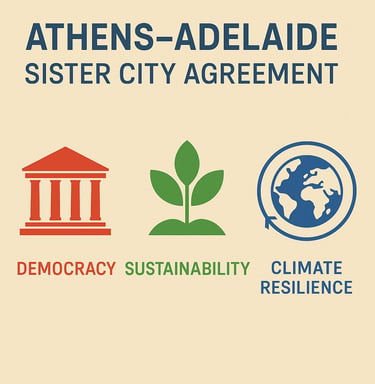Adelaide’s Sister City with Athens Must Be More Than Symbolic
Stewart Sweeney
When the City of Adelaide announced its intent to establish a sister-city relationship with Athens, it was easy to see the appeal. Athens is the birthplace of democracy, philosophy, and much of the civic culture that shaped the Western world. Its brand is global.
But if Adelaide wants this relationship to be meaningful rather than decorative, it must do more than bask in reflected glory. Athens has earned its global stature not just by celebrating its past, but by investing in it and by embedding democracy and climate resilience into its civic identity. Unless Adelaide does the same, the partnership risks ringing hollow.
Athens shows how to connect democracy and climate
Athens is not a large city by global standards. With a municipal population of around 600,000, it is smaller than Adelaide. Yet its reach is vast because it has turned its history into living identity.
It has safeguarded the sites where democracy was born: the Pnyx, where citizens assembled; the Agora, the civic heart of debate and judgment; and the Acropolis, elevated into a global symbol of democratic civilisation. The city created a grand pedestrian promenade that links these places into a continuous civic landscape. It invested in cultural infrastructure, from the Acropolis lighting upgrade to new accessibility routes, so that democracy is not just history but daily experience.
Athens has gone further by linking democracy with climate. It became the first European city to appoint a Chief Heat Officer. It has pledged new trees throughout the city, created shaded squares and walkways and water features, and set caps on daily Acropolis visitors to protect both heritage and people during extreme heat. Its Athens Democracy Forum, held every September, is not only about ideas. It is about survival: how democratic governance can meet the challenge of climate breakdown.
That is why Athens continues to attract millions of visitors, hundreds of millions of euros in cultural revenue, and top-ten rankings for global conferences. Democracy sells — when it is invested in and made relevant. Adelaide will not fully match Athens, however with vision and investment our democracy legacy has the potential to significantly transform our narrative, visibility, appeal and sustainability.
Adelaide risks moving in the opposite direction
Adelaide, too, has a democratic story that should resonate globally. In 1894, South Australia became the first place in the world where legislation was passed for women to both vote and the right to stand for Parliament. That legacy places Adelaide in the same lineage as Athens, Philadelphia, and Cape Town.
But the legacy is under threat. Festival Plaza, the symbolic forecourt to Parliament House, has been given to Sydney developer Walker corporation for a 38-storey speculative office block that will overshadow the Parliament where women’s suffrage was won.
This is not just an aesthetic failure. It undermines Adelaide’s claim to democratic identity and worsens its climate vulnerability. A giant concrete tower amplifies the urban heat island, blocks cooling breezes, increases traffic and shading stress, and erodes the open civic space that should serve as Adelaide’s democratic heart.
Where Athens caps heights to protect heritage and adapts its public realm to a heating climate, Adelaide is deregulating them at the expense of its most important civic space and landscape. The irony could not be sharper: at the very moment we seek a sister-city tie with Athens, we are betraying the very values that make that link credible.
The Democracy Hub alternative
It doesn’t have to be this way. Festival Plaza could instead host a Democracy Hub — a low-rise, people-centred civic centre that frames Parliament rather than burying it. The Hub could:
• House exhibitions and events on women’s suffrage, Indigenous rights, and global democracy struggles.
• Anchor an annual Adelaide Democracy Forum, aligned with International Democracy Day.
• Award a South Australian Democracy Prize for contributions to democracy and justice.
・Link with the Adelaide Festival and OzAsia Festival.
• Create a civic promenade linking Parliament, Elder Park, and North Terrace, echoing Athens’ democratic unification project.
• Integrate tree canopy, shade, and water features to make Festival Plaza a living showcase of climate adaptation.
By doing so, Adelaide would present itself to Athens not as a junior partner, but as a true counterpart: a city that also connects democracy with climate resilience.
The real test of the MOU
A sister-city relationship with Athens is logical, but it is also a test. Athens has earned its stature by protecting and investing in its democratic heritage and embedding climate resilience into governance. Adelaide cannot claim parity unless it does the same.
That is why the Memorandum of Understanding (MOU) currently being drafted is so important. It cannot be a bland statement of friendship. It must embed and support the goals of democratic identity and climate adaptation. It should spell out Adelaide’s commitment to protecting Parliament’s setting, building a Democracy Hub, and aligning with Athens’ climate leadership.
Such a foundation would give Athens reason to take Adelaide seriously, and it would give Adelaide a roadmap toward 2036. Without it, the partnership risks being symbolic. With it, Adelaide could stand shoulder to shoulder with Athens as a city that not only made democratic history but continues to invest in it.
Conclusion: A sister-city test
If we proceed with Walker Tower 2, we will be offering Athens a partnership in name only, reaching for democracy abroad while erasing it at home. If we build a Democracy Hub, and if we write those commitments into the MOU, we can offer something real: a shared project of protecting democracy and climate for future generations.
Athens has shown the way. Now Adelaide must decide: democracy and climate, or concrete and heat.

